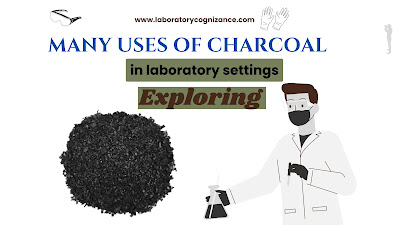Charcoal and Its Versatile Applications
Introduction
Charcoal, a porous & black carbonaceous material, has been used for centuries for various purposes, from cooking fuel to water filtration. In recent years, scientists & researchers have discovered its unique properties and have found numerous applications in the laboratory setting. In this blog, we will explore the different ways charcoal can be used in the laboratory and the benefits it provides.

Charcoal as a Solid Support
Charcoal’s porous nature makes it an excellent solid support material for chromatography and other separation techniques. It can be used to separate mixtures of compounds based on their physical and chemical properties, such as polarity and size. Additionally, its high surface area-to-volume ratio allows for maximum interaction between the solid support and the sample, resulting in better separation & purification.
Charcoal as a Filter
Charcoal’s porous structure also makes it an effective filter material. It can be used to remove impurities from liquids & gases, such as contaminants, toxins, and odors. Charcoal filters are commonly used in air and water purification systems to improve the quality of the surrounding environment.
Charcoal as a Catalyst
Charcoal can also act as a catalyst, a substance that increases the rate of a chemical reaction without undergoing any chemical change itself. Charcoal catalysts have been used in various chemical reactions, such as the production of hydrogen gas, the synthesis of organic compounds, and the reduction of metal ions.
Charcoal as an Adsorbent
Charcoal’s high adsorption capacity makes it an effective material for removing pollutants and toxins from the environment. It can adsorb a wide range of organic and inorganic substances, including heavy metals, pesticides, and dyes. Charcoal adsorbents have been used in environmental remediation projects to clean up contaminated soil & water.

Conclusion
Charcoal’s unique properties, such as its porosity, high surface area, and adsorption capacity, make it a versatile material with numerous applications in the laboratory. Its use in solid supports, filters, catalysts, and adsorbents has been instrumental in advancing scientific research & improving environmental sustainability. As scientists continue to explore the properties of charcoal, it is likely that even more applications will be discovered in the future.






1 thought on “Charcoal and Its Versatile Applications in the Laboratory”